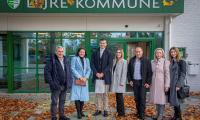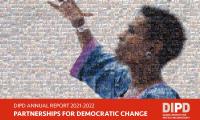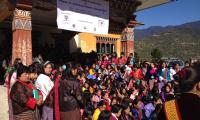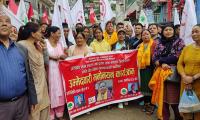Politicians from North Macedonia visit Denmark: “We must think globally but act locally”
Politicians from North Macedonia are visiting Denmark as part of their partnership with the Danish Liberal Party to support local democracy and EU integration in the smaller Balkan country.

The Liberal Party of Denmark, Venstre, which is represented by the Danish Liberal Democracy Programme (DLDP), has partnered with the Liberal Democratic Party (LDP) in North Macedonia to strengthen the party at a local level and support the country’s EU aspirations.

Denmark has a long tradition and history of local democracy and decentralised local government. In more than 100 years, Venstre has played a crucial role in Danish municipal politics and is currently holding 34 positions as mayor out of 98, creating a solid foundation for the partnership to strengthen local and multiparty democracy.
During their weeklong visit to Denmark, the North Macedonian politicians are visiting several Danish municipalities, such as Copenhagen, Lejre, and Vordingborg. DIPD has spoken with one of the visitors, Ivan Durgutov, DLDP Programme Officer for Liberal Institute Skopje.
“It has been a very productive and positive experience to visit the municipalities in Denmark. I was very impressed by the mayor of Lejre, Tina Mandrup. She showed how important it is to create a municipality that the citizens feel connected to and feel like it is their home. I will take this mindset with me back to North Macedonia: to think globally but act locally. To focus on the issues close to the voters’ and citizens’ hearts and lives.”
“A municipality must be open and accessible; it is for that reason that local democracy exists. The municipality should be the citizens second home.”
Democracy support on a large scale
Local politics and local party structures are the focus of this mutually beneficial partnership between Venstre and the LDP. Supporting local branches of a national party is crucial, but the partnership has made it clear that the dimension of national and European democracy cannot be overlooked in this case.
North Macedonia has had eyes on joining the EU since they sent in their formal application in 2004. The country was accepted as a candidate country in December 2005, but since then, progress has been stalled due to several bilateral disputes between EU countries and North Macedonia.
First, there was the name dispute with Greece, resulting in North Macedonia changing its name from the former Yugoslav Republic of Macedonia to North Macedonia. Currently, Bulgaria has opposed North Macedonia’s EU negotiation process, as Bulgaria demands that the Bulgarian minority be included explicitly in the North Macedonian constitution.
North Macedonia is a multi-ethnic, multi-religious, and multi-cultural country, and forthcoming changes to the constitution will consist of including several minorities, expectantly resulting in opening the chapters of the EU negotiations.
Drop in the support for EU
The LDP is part of the pro-European governing coalition and parliamentarian majority, which is important for the coalition due to the planned upcoming constitutional change.
Ivan Durgutov explains that the long process has made the percentage of EU supporters slowly drop. There is still a high level of support for EU membership, but the tendency worries the LDP.
“People start to feel that the Macedonian people do everything they are asked for. In recent times, the EU talks in the country have been seen more as something about historical narratives and bilateral neighbourhood relations rather than the Copenhagen criteria. At the same time, the name change for some people is a small change – but for others, this is a huge identity marker with high symbolic value and has caused a lot of discussion nationally.”
With the latest updates and fast tracks for countries like Ukraine, there are worries in the country that the feeling of being stalled by the EU will intensify, and the process will be used as an example by the few parties who are not unconditionally for EU membership.
What the EU means for local politics
The Danish Liberal Democracy Programme (DLDP) was established by the Liberal Party of Denmark, Venstre, in 2010 and is financed by DIPD. The DLDP aims to promote multiparty democracy in developing countries, focusing mainly on local government.
The partnership is in tandem with the Swedish Centre Party’s International Foundation (CIS) and is handled by the Liberal Institute Skopje (LIS), the politically affiliated organisation of the LDP.
The focus of the partnership between Venstre and the LDP is twofold: to speed up North Macedonia's integration into the European Union and to increase the LPD's ability to play a positive role in local politics. These two goals are intertwined, as Ivan Durgutov explains it:
“What has been made clear even more during this visit is that EU politics is not just bureaucratic and big politics. The EU is also for the local governments to support local politics. It is important that people know what the EU can do for them when it comes to agriculture, education, social care, and much more.”
“I believe that if we achieve that even the people living in the furthest point of the country know what the EU means for individual citizens to secure a better life, it will only increase their support for joining the EU even more.”



